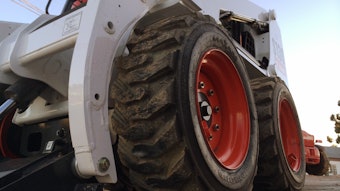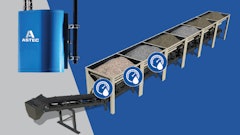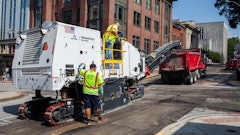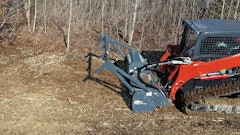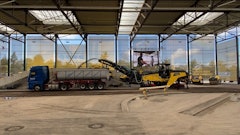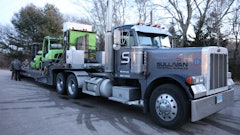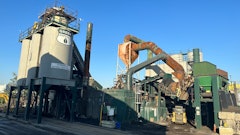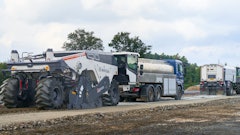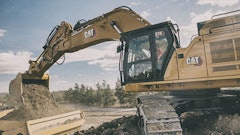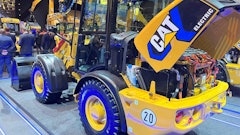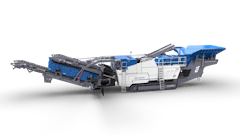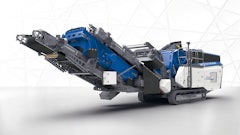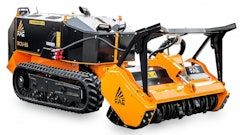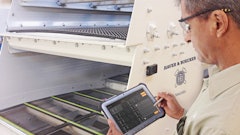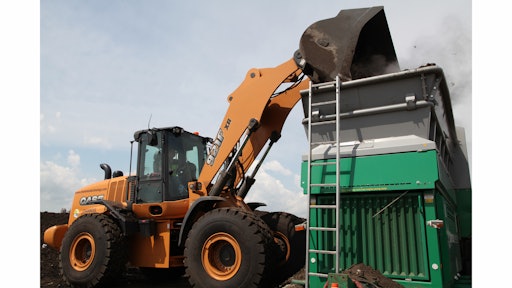
Sustainability has been at the forefront of Chamness Technology Inc.'s (CTI) business practices long before it was a buzzword in the industry. Today, with 27 years under its belt, the company continues to live its corporate message of sustainability through its work and with the purchase of three new Tier 4 wheel loaders.
CTI specializes in the collection, transport and processing of organic industrial bio solids generated primarily at food processing and distribution facilities and agricultural processing sites. A total of four organics recycling sites (two in Nebraska, one in Kansas and one in Iowa) take commercial and industrial organic streams of material and convert it into soil-enhancing compost with a combined average processing of over 400,000 tons annually.
CTI operates its own transportation fleet specializing in the safe and efficient transport of those organic bio solids to permitted compost sites or offers direct application of those materials to agricultural land stretching from Texas to Minnesota and from western Kansas to eastern Illinois. CTI also provides cleaning and processing of industrial and municipal wastewater treatment lagoons.
In yet another discipline, the company also has a sister business called GREENRU, which collects food waste from commercial sources such as grocery stores, restaurants, hospitals and schools. With two routes in eastern Iowa, it uses the collected food waste to make compost.
With its extensive scope of work, and high-profile clients such as Cargill, John Deere, Hy-Vee and Costco, sustainability and efficiency are important values to CTI. The idea of sustainability goes beyond just its end product. The company puts the same principles into its equipment purchasing decisions, working to match productivity goals with equipment that proves efficient in terms of fuel use and emissions standards.
"Sustainability is about efficiency. We hear the legitimate discussion about environmental concerns, but economics has to balance with that, too,” says Dave Klockau, director of sales and marketing at CTI. “When you put those two together, that's why it's so important. That's where environmental issues and economic goals come together with efficiency.”
Efficiency Through Equipment
CTI boasts a fleet of more than 40 different pieces of construction equipment, including wheel loaders, skid steers and excavators. This year, the company added a new Tier 4 Interim 921F wheel loader from Case Construction Equipment to its fleet. Powered by a Tier 4 Interim engine, and proving to boast noticeable fuel efficiency ratings, the machine has fit squarely in the company’s mantra of sustainability and efficiency.
When it first started researching potential wheel loaders, CTI wanted a unit that was up to date with today’s technologies, with good fuel efficiency and power. The 921F uses selective catalytic reduction (SCR) only technology to meet Tier 4 Interim regulations. This system treats emissions separately with diesel exhaust fluid (DEF), which doesn’t require the engine to re-circulate exhaust gas. SCR is an aftertreatment system that works independently of the engine, so it lets the machine maintain horsepower without sacrificing breakout force. This optimizes combustion and machine performance, lowers temperatures, lowers fuel consumption and reduces maintenance and downtime. There is also no need for recirculation equipment or a diesel particulate filter (DPF), allowing for lower long-term maintenance costs.
Not to mention the wheel loader created the opportunity for CTI to save somewhere between $17,570 and $30,120 in fuel savings per year. (NOTE: Fuel savings figured using a standard 251 work day year with 10 hours of operation each day, fuel savings of 2 to 3 gallons per hour and diesel prices ranging from $3.50 to $4.00.)
“Depending on how much drive time we do each day, we’re running around 3 to 4.5 gallons per hour. On our old loaders, it would be anywhere from 4.5 up to 6.5. We’re saving about 2 to 3 gallons per hour,” says Stephen Chamness, a wheel loader operator at CTI. “Fuel is one of your largest costs for how high gas prices are nowadays. A gallon here, a gallon there – it adds up when you’re running a loader like we do every day.”
The 921F wheel loader also features four programmable power modes: ECO for maximum fuel efficiency, Standard for quick loading, MAX for aggressive digging and AUTO for engine output that responds on the fly. This further aids in managing fuel economy.
“The four power modes really help. There’s no sense in me running full throttle for 500 feet when I can have it in ECO mode and get the job done just as well, if not better, while saving fuel,” Chamness says.
Equipment That Cares?
When CTI was looking for a wheel loader, another one of the top considerations was a loader that would provide it with a great warranty and proactive service. In case an issue arose, it wanted a reliable company to fall back on while receiving the help it needed.
Because of that, CTI went to its local dealer, Titan Machinery in Des Moines, IA, and learned about the ProCare package that came standard on the new 921F. “I think what separated this loader vs. the competitors was the service that Titan offered us through ProCare and the telematics,” Chamness says.
ProCare is an all-in-one heavy machine support program that comes standard on Case wheel loaders. It includes a suite of product assurances including a three-year/3,000-hour full machine factory limited warranty, three-year/3,000-hour planned maintenance and a three-year advanced SiteWatch telematics subscription.
Depending on the customer and application, ProCare can generally provide at least $7,500 in savings from planned maintenance costs alone over the first three years of the machine. “With ProCare, they do all of the oil changes and filters, and it's all included with the purchase price,” Chamness says. “By having them come down, they have their trained mechanics do the servicing themselves. That way, it's done up to Case's standards.”
Along with ProCare, CTI was impressed with SiteWatch, a telematics, remote monitoring and data reporting solution that tracks machine maintenance, health and utilization so users can easily manage their fleets and optimize machine performance and utilization.
“You can tell when the loader is on, if it's been sitting, or it also sends out an email warning if it were to have a low engine oil level. It will send out an email to whoever you would like it to, just to say, ‘Hey, you need to check on the loader and get it back up to standards’,” Chamness explains.
Along with the technology, CTI found the comfort of these machines to be beneficial, as well. Operators sometimes spend as much as 13 hours a day in the machine, so cab comfort is a very important feature for them.
With one of the largest cabs in the industry, the 921F’s cab features a dual air filtration system and an isomount cab design that reduces external noise and vibration. The wheel loader also features joystick steering, which allows operators to move between the joystick and steering wheel. The ergonomic design and responsive control reduce operator fatigue and help improve cycle times.
“I love how comfortable the cab is," Chamness says. "You get in some loaders and get tired of sitting in it. There are days that I sit for five to six hours at a time before I get out and walk around. The 921F cab is really comfortable.”
Equipment to Grow On
With the success of the 921F purchase, CTI has added two more XX loaders to their fleet. (Info needed from Dave). CTI is working on an expansion project in Eastern and Western Iowa, along with Illinois and Ohio, so the equipment will be put to good use.
Along with the nature of its business and these new machines, CTI has bought hybrid vehicles for its sales team and uses water it captures in the windrows for irrigation purposes in fields on their 400 acres of land. “We have to practice what we preach,” Klockau says.
“Efficiency is key,” Klockau concludes. “We talk about sustainability and beneficial reuse, but it all comes down to efficiency. Sustainability has to have an environmental benefit sure, but and an economic benefit, too. When we spec’d out the equipment we were using and what we needed to replace it with, it just made sense to get something that was going to be more efficient. It’s very simple.”
Additional information provided by Philippe Bisson, brand marketing manager, Case Construction Equipment.



